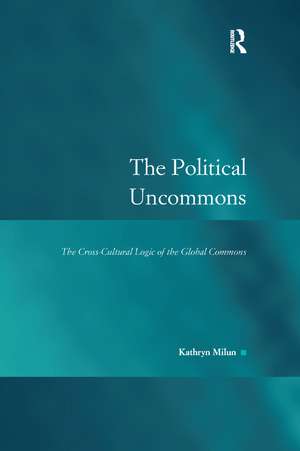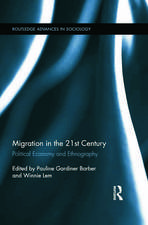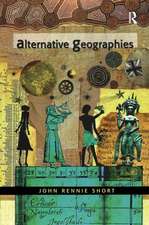The Political Uncommons: The Cross-Cultural Logic of the Global Commons: Law, Justice and Power
Autor Kathryn Milunen Limba Engleză Paperback – 18 oct 2018
| Toate formatele și edițiile | Preț | Express |
|---|---|---|
| Paperback (1) | 449.41 lei 6-8 săpt. | |
| Taylor & Francis – 18 oct 2018 | 449.41 lei 6-8 săpt. | |
| Hardback (1) | 1054.71 lei 6-8 săpt. | |
| Taylor & Francis – 28 ian 2011 | 1054.71 lei 6-8 săpt. |
Din seria Law, Justice and Power
-
 Preț: 63.00 lei
Preț: 63.00 lei - 12%
 Preț: 299.52 lei
Preț: 299.52 lei - 12%
 Preț: 339.48 lei
Preț: 339.48 lei - 12%
 Preț: 299.52 lei
Preț: 299.52 lei - 22%
 Preț: 324.16 lei
Preț: 324.16 lei - 13%
 Preț: 338.33 lei
Preț: 338.33 lei - 22%
 Preț: 324.16 lei
Preț: 324.16 lei -
 Preț: 198.19 lei
Preț: 198.19 lei -
 Preț: 469.34 lei
Preț: 469.34 lei - 15%
 Preț: 556.86 lei
Preț: 556.86 lei - 12%
 Preț: 312.43 lei
Preț: 312.43 lei -
 Preț: 489.26 lei
Preț: 489.26 lei - 13%
 Preț: 338.48 lei
Preț: 338.48 lei -
 Preț: 462.60 lei
Preț: 462.60 lei - 17%
 Preț: 259.98 lei
Preț: 259.98 lei -
 Preț: 385.80 lei
Preț: 385.80 lei -
 Preț: 436.14 lei
Preț: 436.14 lei - 18%
 Preț: 945.01 lei
Preț: 945.01 lei
Preț: 449.41 lei
Nou
Puncte Express: 674
Preț estimativ în valută:
86.00€ • 88.08$ • 71.54£
86.00€ • 88.08$ • 71.54£
Carte tipărită la comandă
Livrare economică 19 martie-02 aprilie
Preluare comenzi: 021 569.72.76
Specificații
ISBN-13: 9781138376441
ISBN-10: 1138376442
Pagini: 240
Dimensiuni: 156 x 234 mm
Greutate: 0.45 kg
Ediția:1
Editura: Taylor & Francis
Colecția Routledge
Seria Law, Justice and Power
Locul publicării:Oxford, United Kingdom
ISBN-10: 1138376442
Pagini: 240
Dimensiuni: 156 x 234 mm
Greutate: 0.45 kg
Ediția:1
Editura: Taylor & Francis
Colecția Routledge
Seria Law, Justice and Power
Locul publicării:Oxford, United Kingdom
Cuprins
Contents: Introduction; An emergent global commons: biodiversity - a case study of how culture becomes law and nature becomes empty space; Part I Res Nullius/Terra Nullius and the Epistemic Imaginary of International Law: Terra nullius, res nullius and res communis: a conceptual confusion of terms; Res nullius - the tragedy of the (modern global) commons: from Grotius and the high seas to the internet; Covering res that move: theory and practice: whales as res divini juris; The law of the seas extended vertically into the law of outer space and the law of outer space reterritorializing the Earth. Part II Two Cases of the Revocation of Terra Nullius: the Western Sahara case: genealogies captured by the census; Negotiations and the Mabo case: comparative epistemic imaginaries. Conclusion: beyond empty space - expanding the epistemological repertoire of the global commons through biofigural and technological imaginaries; Bibliography; Index.
Notă biografică
Kathryn Milun teaches in the Anthropology/Sociology department of the University of Minnesota Duluth and has a Ph.D. in Comparative Literature and Cultural Studies. She is the author of Pathologies of Modern Space: Empty Space, Urban Anxiety and the Recovery of the Public Self (Routledge, 2007).
Recenzii
'Back in the exhilarating days of rampant culture theory during the 1980s when all manner of concepts applied in our everyday lives were being critically rethought, I considered Kathryn Milun's scholarship on "empty space" both exemplary and exciting. Now in our age of doing, of activist desire and effort, I meet again Milun's work, but this time as the most successfully realized case of scholarly action, following the threads of her earlier work to achieve a legally cunning and ethnographically plausible program for establishing commons in the new empty spaces amid and alongside neoliberal designs.' George E. Marcus, University of California, Irvine, USA and co-author of Designs for an Anthropology of the Contemporary
Descriere
This book presents a cultural history of the global commons, connecting the logic of legal institutions governing global commons to colonial doctrines that dispossessed indigenous peoples of their land. It demonstrates how global commons regimes might benefit from the cross-cultural logics found where indigenous peoples have gained recognition of their common tenure systems in Western courts.
























